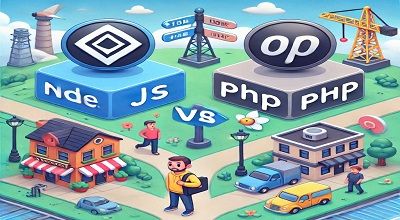Node.JS vs PHP
Node.JS vs PHP: Deciding which platform is best for development, whether Node.js or PHP. It depends on various factors, including the project requirements. The familiarity of the development team, performance needs, scalability, and community support. Here’s a comparison of both:
Node.js:
- Performance: Node.js is known for its high performance due to its non-blocking, event-driven architecture. Making it suitable for real-time applications and handling a large number of concurrent connections.
- Scalability: Node.js can handle concurrent connections efficiently, which makes it scalable for applications that require high scalability.
- JavaScript: Since Node.js is based on JavaScript, developers. Those who are already familiar with JavaScript can easily transition to server-side development, leading to faster development cycles.
- Community and Ecosystem: Node.js has a large and active community with a vast ecosystem of libraries. Frameworks are available through npm, which can expedite development.
- Asynchronous Programming: Node.js promotes asynchronous programming, which can lead to more efficient handling of I/O-bound operations.
PHP:
- Simplicity: PHP is often praised for its simplicity and ease of learning, making it an attractive option for beginners and small projects.
- Maturity: PHP has been around for a long time and has a mature ecosystem with a wide range of frameworks (like Laravel, and Symfony) and libraries available for various purposes.
- Shared Hosting: PHP is widely supported by shared hosting providers, making it a preferred choice for smaller projects or websites.
- Popular CMS and Frameworks: PHP powers many popular Content Management Systems (CMS) like WordPress, Drupal, and Joomla, which can be advantageous for certain types of projects.
- Synchronous Programming: PHP follows a synchronous programming model. Which can simplify certain types of applications and make code easier to understand for some developers.
Conclusion
In conclusion, the choice between Node.js and PHP depends on your specific project requirements, team expertise, scalability needs, and other factors. Both platforms have their strengths and weaknesses, and ultimately, the best choice will depend on the context of your project.
